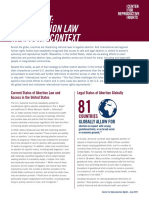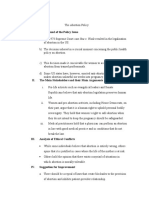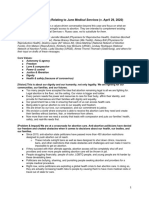Position Paper
Committee – United Nations Commission on the Status of Women
Agenda – Protection and Provision of Healthcare Facilities for Reproductive and
Maternal Rights, Including Access to Safe Abortion Services
Country – Republic of Poland
Introduction to the topic
Reproductive and maternal rights encompass the freedom and access for individuals—
especially women—to make informed decisions about their reproductive health. This
includes contraception, quality maternal care, and safe, legal abortion services. Globally,
unsafe abortions contribute significantly to maternal mortality, especially where laws are
restrictive or healthcare is inaccessible. The integration of these rights into national
healthcare systems is vital for gender equality and the upholding of basic human dignity.
Ensuring universal access to comprehensive reproductive healthcare is not only a human
rights issue but a public health imperative for reducing disparities and promoting the well-
being of women and families.
Republic of Poland Stance
Poland’s national stance on reproductive rights, particularly abortion, reflects a complex
intersection of historical, religious, legal, and socio-political influences. As of the 2020 ruling
by the Constitutional Tribunal, Poland only permits abortion in cases where the pregnancy
poses a serious threat to the woman’s health or life or is the result of rape or incest. This
ruling invalidated previous provisions that allowed abortion in cases of fetal impairment,
thereby creating one of the most restrictive abortion regimes in Europe.
This legal framework has been met with widespread domestic and international criticism.
International human rights bodies such as CEDAW and the UN Human Rights Committee
have raised concerns that Poland's restrictions violate women's rights to health, autonomy,
and freedom from inhumane treatment.
However, in response to national and global scrutiny, the Polish government has introduced
measures in 2024 aimed at improving clarity and access within the existing legal
framework. These include the removal of the “conscience clause” that allowed doctors to
refuse abortion services and the issuance of clinical guidelines ensuring that one doctor’s
recommendation is sufficient for proceeding with a legal abortion when the woman’s health
is at risk.
�Poland remains committed to engaging in dialogue around reproductive rights while
balancing national legal standards, cultural values, and international obligations. The
country acknowledges that further steps must be taken to protect women’s health and
rights and to ensure reproductive justice.
Problems and Solutions
Problems:
Severe Legal Restrictions: Abortion is nearly inaccessible, leading women to seek
unsafe or illegal alternatives or to travel abroad for services.
Chilling Effect on Healthcare Providers: Legal ambiguity and fear of prosecution
deter doctors from performing even lawful abortions.
Inadequate Access to Contraception: Poland ranks among the lowest in Europe in
access to modern contraceptive methods.
Cultural and Religious Stigma: Deep-rooted Catholic values discourage open
discussion and education on reproductive rights.
Lack of Sex Education: Comprehensive reproductive health education is absent from
school curricula, leaving many unaware of their rights and options.
Limited Maternal Health Resources: Rural and underfunded regions face shortages
in prenatal and postnatal care services.
No Formal Support for Abortion Aftercare: Women who have abortions abroad
receive little or no psychological or medical support when they return.
Misinformation and Polarization: Media narratives and political discourse often lack
evidence-based information, leading to public confusion and fear.
Solutions:
Legal Clarity and Reform: Define clear legal guidelines to protect women and
healthcare providers under existing exceptions; consider legal reform that balances
national and human rights standards.
Strengthen Public Healthcare Services: Expand access to maternal care,
contraception, and reproductive services, especially in underserved areas.
Training for Medical Professionals: Educate doctors and nurses on lawful abortion
provision and reproductive rights within ethical medical practice.
Public Awareness Campaigns: Launch nationwide initiatives to normalize
conversations around reproductive health and correct misinformation.
Revise Education Curriculum: Introduce age-appropriate, science-based sex
education in schools.
Create Support Networks: Establish confidential hotlines, counseling centers, and
legal aid clinics for women facing reproductive health issues.
Subsidized Contraception and Maternal Services: Provide affordable access to
modern contraceptives and maternal health services, especially for low-income
populations.
� Civic and Religious Dialogue: Engage religious leaders and civic organizations in
respectful, evidence-based discussions on women's health and rights.
Conclusion
Poland’s current approach to reproductive and maternal rights reflects a highly restrictive
legal environment, shaped by deep-rooted cultural and political forces. While existing laws
permit abortion only under extreme circumstances, the recent governmental efforts to
clarify medical guidelines and remove institutional barriers signal a cautious but important
shift.
To genuinely uphold women’s reproductive rights, Poland must continue aligning its
national policies with international human rights standards. This includes expanding legal
access, improving healthcare infrastructure, increasing public awareness, and ensuring that
healthcare providers are empowered to act without fear. A comprehensive, inclusive, and
rights-based framework is essential for protecting the dignity, autonomy, and health of all
Polish women.
Poland stands ready to participate in collaborative global efforts that prioritize safe, ethical,
and accessible reproductive healthcare for all.





















































































